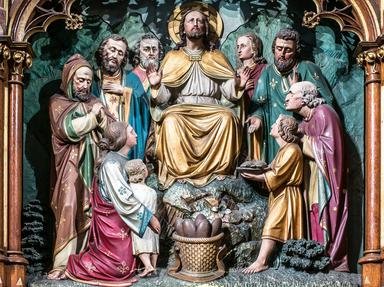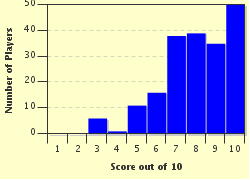Quiz Answer Key and Fun Facts
1. 1 Samuel, chapters 9-31 tells the story of this king, son of Kish, who was appointed by Samuel and ruled Israel from around 1049 BC to 1007 BC. He ruled from Gibeah, a hill near what was to become the city of Jerusalem. He died by falling on his sword at the Battle of Gilboa. Three of his sons, including Jonathan, also died during this battle. Who was this King of Israel?
2. 1 Samuel Chapter 17 describes an apparently uneven battle between a very large Philistine warrior and a much smaller Jewish shepherd armed with a sling and some stones. The young man won and eventually became which great king of Israel?
3. This wise King of Israel was the second son of King David and his wife Bathsheba. 1 Kings Chapter 3 verses 16-28 recounts how this man determined the real mother of a child between two claimants, by threatening to divide the child in two. He is also renowned for his great wealth. Although this is in some dispute, this man was also reputedly the author of the Bible books Ecclesiastes, Proverbs and his eponymous 'Songs'. So who was this King of Israel?
4. Unlike many other kings of Judah, this man, the son of King Asa, was seen as a man of peace and virtue. He took the throne at the age of 35 in 870 BC and ruled for 25 years. 2 Chronicles Chapter 17 verses 7-9 describes this king sending out his priests and Levites to instruct people in the way of the Law. Nowadays, according to a mild expression of surprise, this man 'jumped'! So who was this man, whose only major blemish was to marry his son to the daughter of King Ahab of Israel, which resulted in the Battle of Ramoth-Gilead?
5. As described in chapter 17 of the Old Testament Book 2 Kings, this man is notable because he was the last King of the Israelite Kingdom of Israel (based in Samaria). He slew his predecessor Pekah in 732 BC and ruled the northern Kingdom of Israel for 12 years. His power base remained while he paid tributes (tax money) to the Assyrians. Around 721 BC these payments were stopped and the Assyrians, under Shalmaneser V, invaded. So who was this last King whose reign ended when he was arrested by the Assyrians?
6. This man ruled the Chaldean Empire from approx 605-562 BC. According to the Book of Daniel, he conquered Jerusalem, sending the Jews into exile. He dreamed about a large tree which Daniel interpreted as meaning he would go insane for seven years; this then occurred. After this, the king repented and praised God. The Book of Jeremiah also records the actions of this man as he destroyed Jerusalem and the First Temple. But who is this king, who is also credited with creating the Hanging Gardens of Babylon?
7. This king, a practicing Jew, is sometimes called 'the Great' although he was also a cruel tyrant. He ruled Judea on behalf of Rome for 37 years to his death at age 70 in 4 BC. One of his most infamous acts, described in Matthew (2:1-4, 7, 16) was to use his soldiers to kill all male children two years old and under in Bethlehem and the surrounding areas in an attempt to kill the infant Jesus. So who was this king?
8. This ruler of Judea conducted the trial of Christ as described in several gospels including Mark Chapter 15, verses 1-15. He ruled from 26-36 AD, yet relatively little is known of the man whom Matthew described 'washing his hands' of responsibility for the ensuing crucifixion. Who was this man who asked the crowd whether they wanted him to release the thief Barabbas or the King of the Jews?
9. This man became the second Roman Emperor after the death of Augustus in 14 AD. Luke 3:1 records that John the Baptist began preaching in the 15th year of this emperor's reign. Although he ruled in Rome throughout the latter half of Christ's life, historians are unsure whether this man knew much about Jesus and his preaching. So who was this emperor, who was also the adoptive grandfather of Caligula?
10. The four gospels provide detailed accounts of this "King's" life and death, all told with slightly different perspectives. This man was both revered and feared; his death and subsequent resurrection are a focal point for Christian belief. So who is this man of whom the governor asked "Are you the King of the Jews?" at his trial?
Source: Author
MikeMaster99
This quiz was reviewed by FunTrivia editor
CellarDoor before going online.
Any errors found in FunTrivia content are routinely corrected through our feedback system.

